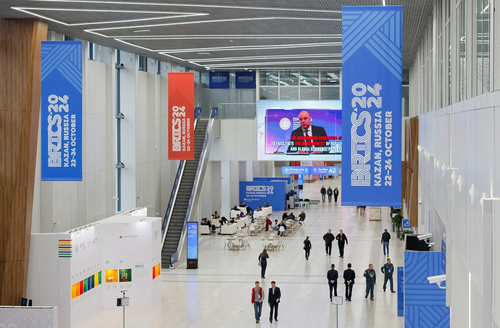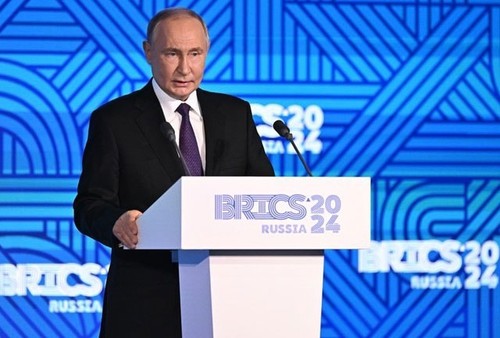 (photo: Reuters) (photo: Reuters) |
Themed “Strengthening Multilateralism for Equitable Global Development and Security”, this year’s BRICS Summit brings together senior leaders of nine members (Russia, Brazil, India, China, South Africa, Egypt, Ethiopia, Iran, and the UAE), along with leaders of 20 partner countries and international organizations.
Higher status
The theme of this year summit clearly demonstrates the priorities that the host Russia wants to promote – politics-security, economics-finance, and culture-humanity. Speaking at a press conference before the summit, Russian President Vladimir Putin said that BRICS is playing a larger role in all aspects of international relations – economics, geopolitics, security, and culture.
BRICS’s increasing role is clearly demonstrated in its larger proportion of the global economy and the growth momentum it creates.
President Putin said: “Over the past 10 years, more than 40% of global GDP growth has come from BRICS countries. The average rate of economic growth in BRICS is projected at 4%. This is higher than both the rate in the G7 countries – just 1.7% – and the global rate of 3.2%.”
The new status of BRICS is seen clearly in comparison with the G7– the growth charts of the two are headed in the opposite direction. According to the International Monetary Fund, BRICS countries account for 45% of the world's population and 35% of global GDP, while the G7 accounts for only about 10% of the world's population and 30% of global GDP. By the end of this decade, the GDP of BRICS will increase to 37% of the global economy, while the G7's share will decrease to 28%. This gap could be even larger if BRICS admits more members in the coming years.
BRICS is gradually refining its organization and strategy to take on a larger geopolitical dimension, moving beyond its initial role as an economic cooperation bloc of emerging economies.
Since last year's BRICS Summit in South Africa, the bloc has added four new members and Turkey, Thailand, Cuba, and several other countries have publicly expressed their desire to join. BRICS has begun to discuss ambitious plans to create new financial systems and security cooperation mechanisms to create a more balanced position in an economic and political order that Western countries currently dominate.
Raymond Matlala, President of the South African BRICS Youth Association, said: "BRICS is the voice of the Global South in this multilateral platform where the West dominates. No other platform or association can rescue the Global South from the current global order, only the BRICS with its powerful voice and collaboration."
 Russian President Vladimir Putin speaks at an event before BRICS Summit in Kazan. (photo: RIA NOVOSTI) Russian President Vladimir Putin speaks at an event before BRICS Summit in Kazan. (photo: RIA NOVOSTI) |
New strategies
One of the key topics at this year’s BRICS Summit is building a new international payment system independent of current international payment systems held by Western banks and financial institutions. The plan, whose discussions began at last year's Summit, is important not only because host Russia has been under numerous sanctions from the West since the Ukraine conflict broke out in February 2022, but also because other BRICS members don’t want to be dependent on Western financial systems at the risk of future decisions against them.
In addition to a new international payment system, some countries want to build a shared BRICS currency. But economists believe that, given the current geopolitical and economic instability and BRICS’ lack of cohesion, its members will proceed cautiously in creating a new system that defies the West.
Theresa Fallon, founder of the Center for Russia, Europe, and Asia Studies, in Brussels, said: "The two other players in this expanded grouping who want to shape or stay in the non-aligned aspect that would be India and Brazil, so how they managed to navigate that will remain to be seen."
Another topic BRICS leaders will discuss in Kazan is the admission of new members. In a recent statement, Russian Foreign Minister Sergei Lavrov said BRICS should temporarily suspend the admission of new members in order to stabilize the organization and determine its overall strategic goals.
Countries are pressing to join BRICS soon, most notably Turkey, a member of NATO and a candidate for EU membership. The admission of a member like Turkey could quickly increase BRICS' political and economic power, but could also pose difficult long-term strategic problems, as BRICS wants to create its own position and identity serving the Global South.